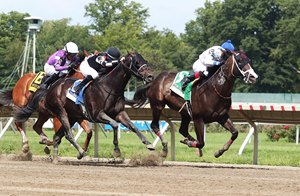Monmouth to Open With HISA Riding Crop Rules


With new federal regulations set to take effect July 1 under the Horseracing Safety and Integrity Authority, the New Jersey Racing Commission rescinded its ban on Thoroughbred jockeys' use of the riding crop during its April 22 meeting.
When Monmouth Park begins its meet May 7, the track will operate under house rules that mirror those that HISA will begin implementing across the country this summer. Those rules allow for a jockey to strike a horse six times with the riding crop in an overhand fashion, though not more than two times in succession without a pause.
Last summer, jockeys in New Jersey were allowed to carry riding crops but could only use them for safety reasons, such as if a horse was trying to bear out or place a rider in a dangerous position.

In an interview after the meeting, Dennis Drazin, chairman and CEO of Monmouth Park, applauded the commission's decision, which passed on a 5-1 vote. He called Friday "a good day for racing in New Jersey."
"We think they certainly acted appropriately (since) HISA is going to have a new riding crop rule in effect July 1. It made no sense to start with one riding crop rule and switch halfway through," he added.
Drazin said a new New Jersey riding crop rule wouldn't have received the necessary state clearance after public comment before the meet began. So that meant Monmouth Park would need to enforce limitations on six strikes by house rule until HISA brings rule uniformity this summer across the country.
"We'll have a three-person committee, probably, comprised of our placing judges, who will review the films, decide if there are any violations," Drazin said. "Ultimately the racing secretary, John Heims, has the ultimate say. If someone wants a hearing or an appeal, they'll go before him. He'll adjudicate it, and hopefully there won't be any problems."
Terry Meyocks, president and CEO of Jockeys' Guild, said his organization welcomes uniformity, though he called Monmouth Park's proposed penalties for violating riders "harsh." Sanctions are based on the number of infractions a rider has committed, with offenders penalized by a percentage of a jockey's earnings in a given race, plus fines and suspensions.
A first offense would result in a $500 fine and a three-day suspension. A second occurrence would lead to a $2,500 penalty and a seven-day suspension. A third violation would result in a $5,000 fine and suspension for the rest of the meet.
Meyocks backs rules established by the Kentucky Horse Racing Commission and Gulfstream Park, who consulted with riders to create their regulations.
Riding crop changes in New Jersey and other parts of the country have largely been made as horse welfare decisions or to improve the sports optics. Meyocks insists the crop is more forgiving than it was more than a decade ago due to positive changes in design and components.
Some jockeys elected to ride without crops at Monmouth last year, while others carried them if needed for safety. Several were sanctioned for using it during racing. In one case, jockey Carlos Montalvo has filed under appeal of the suspension, contending he used it for safety reasons on a horse with a history of drifting out, Meyocks said.
A few jockeys decided to ride elsewhere in opposition to New Jersey's 2021 rule.
"Riding in races is a dangerous sport—jocks know that, and everybody knows it—and we have to do everything we can do to protect horse and rider. The people making these decisions haven't been in that position, for the most part," Meyocks said.
In jurisdictions that have implemented strict riding-crop restrictions, some bettors, jockeys, and horsemen have raised complaints, mainly over concerns that restrictions might prevent a rider from urging a horse to achieve its best finish.
Asked to describe last year's experience at Monmouth Park with the riding crop largely eliminated from use, Drazin chuckled in apparent frustration.
"I guess you roll with the punches. Frankly, there was a lot of controversy with the jockeys and the Jockeys' Guild prior to the meet 'cause they were very upset," he said. "We didn't have a choice. The commission made a rule. It wasn't our rule. They were going to enforce it and left us to clean up the mess. We got through it. We would have preferred we had a uniform rule throughout the country, but timing is everything."
Monmouth Park, one of the top racetracks in the northeast, runs a 62-day meet that continues through Sept. 18. Its season is highlighted by the $1 million TVG.com Haskell Stakes (G1) July 23.
